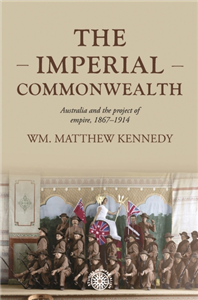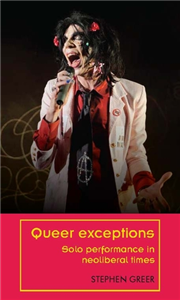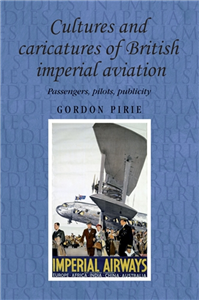Your Search Results
-
Promoted Content
-
Promoted ContentHumanities & Social SciencesFebruary 2017
Cultures and caricatures of British imperial aviation
Passengers, pilots, publicity
by Gordon Pirie, Andrew Thompson, John M. MacKenzie
The new activity of trans-continental civil flying in the 1930s is a useful vantage point for viewing the extension of British imperial attitudes and practices. Cultures and caricatures of British imperial aviation examines the experiences of those (mostly men) who flew solo or with a companion (racing or for leisure), who were airline passengers (doing colonial administration, business or research), or who flew as civilian air and ground crews. For airborne elites, flying was a modern and often enviable way of managing, using and experiencing empire. On the ground, aviation was a device for asserting old empire: adventure and modernity were accompanied by supremacism. At the time, however, British civil imperial flying was presented romantically in books, magazines and exhibitions. Eighty years on, imperial flying is still remembered, reproduced and re-enacted in caricature.
-
 Trusted Partner
Humanities & Social SciencesMarch 2017
Trusted Partner
Humanities & Social SciencesMarch 2017Imperial cities
Landscape, display and identity
by Felix Driver, David Gilbert
Imperial cities explores the influence of imperialism in the landscapes of modern European cities including London, Paris, Rome, Vienna, Marseilles, Glasgow and Seville. Examines large-scale architectural schemes and monuments, including the Queen Victoria Memorial in London and the Vittoriano in Rome. Focuses on imperial display throughout the city, from spectacular exhibitions and ceremonies, to more private displays of empire in suburban gardens. Cconsiders the changing cultural and political identities in the imperial city, looking particularly at nationalism, masculinity and anti-imperialism.
-
 Trusted Partner
Trusted Partner
-
 Trusted Partner
Humanities & Social SciencesJuly 2023
Trusted Partner
Humanities & Social SciencesJuly 2023The imperial Commonwealth
Australia and the project of empire, 1867-1914
by Wm. Matthew Kennedy
From the late 1800s to the early 1900s, Australian settler colonists mobilised their unique settler experiences to develop their own vision of what 'empire' was and could be. Reinterpreting their histories and attempting to divine their futures with a much heavier concentration on racialized visions of humanity, white Australian settlers came to believe that their whiteness as well as their Britishness qualified them for an equal voice in the running of Britain's imperial project. Through asserting their case, many soon claimed that, as newly minted citizens of a progressive and exemplary Australian Commonwealth, white settlers such as themselves were actually better suited to the modern task of empire. Such a settler political cosmology with empire at its center ultimately led Australians to claim an empire of their own in the Pacific Islands, complete with its own, unique imperial governmentality.
-
 Trusted Partner
Humanities & Social SciencesMarch 2017
Trusted Partner
Humanities & Social SciencesMarch 2017The harem, slavery and British imperial culture
Anglo-Muslim relations in the late nineteenth century
by Diane Robinson-Dunn
This book focuses on British efforts to suppress the traffic in female slaves destined for Egyptian harems during the late-nineteenth century. It considers this campaign in relation to gender debates in England, and examines the ways in which the assumptions and dominant imperialist discourses of these abolitionists were challenged by the newly-established Muslim communities in England, as well as by English people who converted to or were sympathetic with Islam. While previous scholars have treated antislavery activity in Egypt first and foremost as an extension of earlier efforts to abolish plantation slavery in the New World, this book considers it in terms of encounters with Islam during a period which it argues marked a new departure in Anglo-Muslim relations. This approach illuminates the role of Islam in the creation of English national identities within the global cultural system of the British Empire. This book would appeal to those with an interest in British imperial history; Islam; gender, feminism, and women's studies; slavery and race; the formation of national identities; global processes; Orientalism; and Middle Eastern studies.
-
 Trusted Partner
Medicine
Trusted Partner
MedicineThe Breastfeeding Book for Special Children
Breastfeeding and Caring for Premature, Ill, or Disabled Newborn Babies
by Brigitte Benkert
The practical handbook for nurses, midwives, and breastfeeding counselors that explains breastfeeding problems that may be encountered with premature and newborn babies, and shows how these special children can be breastfed successfully. The author defines and describes how the time of birth affects a premature baby’s development and explains the concept of “gentle care for premature babies,” presenting it as a resource-oriented, development-supporting approach to care. She explains what is required in order to breastfeed successfully, clearly distinguishing between various difficult starting scenarios for breastfeeding. Target Group: Nurses, midwives, and breastfeeding counselors
-
 Trusted Partner
Trusted Partner
-
 Trusted Partner
August 2011
Trusted Partner
August 2011Total royal
Die Höhen und Tiefen im Leben der Poppy Montague, Platz 87 der britischen Thronfolge
by Dent, Grace / Übersetzt von Häußler, Sonja
-
 Trusted Partner
Trusted Partner
-
 Trusted Partner
Children's & YA
Trusted Partner
Children's & YARoyal Horses (1). Crown Heart
by Jana Hoch
His world is that of the Royals – full of scandals and secrets. Falling in love with him was never part of her plan. Their paths cross at the royal stud farm... Greta just wants to get away: away from her school and away from the friends who have so endlessly disappointed her. The holiday job at the royal stud farm comes at just the right time for her. She might not have any interest in horses – and even less in princes and princesses – but the royal family’s palace still makes her heart beat faster. But on the very first day she quarrels with Edward, the horse trainer. He guesses that she is hiding a secret and wants to do whatever it takes to bring it out in the open. When, shortly afterwards, Prince Tristan appears at the stud farm, Greta’s life is completely turned upside down. She notices all too late that she is in the process of falling in love – and specifically with the boy that she actually wants to stay away from. Humorous and romantic, glamorous and exciting: ‘Royal Horses’ is the perfect love story for all readers from 12 to 99 years-old. Greta and Edward‘s story continues! Volume 2, ‘Crown Dream’ will be out in autumn 2020.
-
 Trusted Partner
Trusted Partner
-
 Trusted Partner
The ArtsMarch 2021
Trusted Partner
The ArtsMarch 2021Queer exceptions
Solo performance in neoliberal times
by Stephen Greer
Queer exceptions is a study of contemporary solo performance in the UK and Western Europe that explores the contentious relationship between identity, individuality and neoliberalism. With diverse case studies featuring the work of La Ribot, David Hoyle, Oreet Ashery, Bridget Christie, Tanja Ostojic, Adrian Howells and Nassim Soleimanpour, the book examines the role of singular or 'exceptional' subjects in constructing and challenging assumed notions of communal sociability and togetherness, while drawing fresh insight from the fields of sociology, gender studies and political philosophy to reconsider theatre's attachment to singular lives and experiences. Framed by a detailed exploration of arts festivals as encapsulating the material, entrepreneurial circumstances of contemporary performance-making, this is the first major critical study of solo work since the millennium.
-
 Trusted Partner
Humanities & Social SciencesJune 2012
Trusted Partner
Humanities & Social SciencesJune 2012Cultures and caricatures of British imperial aviation
Passengers, pilots, publicity
by Gordon Pirie, Andrew Thompson, John Mackenzie
The new activity of trans-continental civil flying in the 1930s is a useful vantage point for viewing the extension of British imperial attitudes and practices. Cultures and caricatures of British imperial aviation examines the experiences of those (mostly men) who flew solo or with a companion (racing or for leisure), who were airline passengers (doing colonial administration, business or research), or who flew as civilian air and ground crews. For airborne elites, flying was a modern and often enviable way of managing, using and experiencing empire. On the ground, aviation was a device for asserting old empire: adventure and modernity were accompanied by supremacism. At the time, however, British civil imperial flying was presented romantically in books, magazines and exhibitions. Eighty years on, imperial flying is still remembered, reproduced and re-enacted in caricature. ;
-
 Trusted Partner
February 2021
Trusted Partner
February 2021Götter des Olymp
by Dimiter Inkiow, Peter Kaempfe, Jette Kaempfe, Ralf Kiwit, Holger Rink, Holger Rink, Norbert Lorenz, Max Meinzold, Barbara Asbeck
Die Griechen verehrten und fürchteten eine Vielzahl von Göttern. Manche waren Berge oder Flüsse, wie der Fluss Skamandros. Andere waren Halbgötter, die wie Fabeltiere aussahen. Die mächtigsten Götter aber lebten auf dem Olymp und über sie alle herrschte Zeus, der zwölf der wichtigsten Götter zu seinen Beratern machte. Sie bildeten den Rat der Götter. Und um sie herum ranken sich zahlreiche Mythen. Mit Geschichten über Aphrodite, Ares, Athene, Hermes, Poseidon und vielen weiteren! Gelesen von Peter Kaempfe.
-
 Trusted Partner
June 1988
Trusted Partner
June 1988Lord Byron
Ein Lesebuch mit Texten, Dokumenten und farbigen Abbildungen
by George Gordon Noël Lord Byron, Gert Ueding
Der Band versammelt nicht nur Texte aus Byrons Werk, in denen das Bildnis des modernen Künstlers als Lord Byron eindringlich zum Ausdruck kommt, darunter besonders Tagebücher und Briefe, sondern auch Zeugnisse, die den Mythos »des wunderbarsten zu eigner Qual geborenen Talents« (Goethe) dokumentieren, also die Kultgestalt Europas, zu der dieser Dichter sich selbst gemacht hat und die als »Byronismus« seine Wirkung bestimmt bis heute.
-
 Trusted Partner
Humanities & Social SciencesMarch 2017
Trusted Partner
Humanities & Social SciencesMarch 2017Imperialism and the natural world
by John M. MacKenzie
Imperial power, both formal and informal, and research in the natural sciences were closely dependent in the nineteenth century. This book examines a portion of the mass-produced juvenile literature, focusing on the cluster of ideas connected with Britain's role in the maintenance of order and the spread of civilization. It discusses the political economy of Western ecological systems, and the consequences of their extension to the colonial periphery, particularly in forms of forest conservation. Progress and consumerism were major constituents of the consensus that helped stabilise the late Victorian society, but consumerism only works if it can deliver the goods. From 1842 onwards, almost all major episodes of coordinated popular resistance to colonial rule in India were preceded by phases of vigorous resistance to colonial forest control. By the late 1840s, a limited number of professional positions were available for geologists in British imperial service, but imperial geology had a longer pedigree. Modern imperialism or 'municipal imperialism' offers a broader framework for understanding the origins, long duration and persistent support for overseas expansion which transcended the rise and fall of cabinets or international realignments in the 1800s. Although medical scientists began to discern and control the microbiological causes of tropical ills after the mid-nineteenth century, the claims for climatic causation did not undergo a corresponding decline. Arthur Pearson's Pearson's Magazine was patriotic, militaristic and devoted to royalty. The book explores how science emerged as an important feature of the development policies of the Colonial Office (CO) of the colonial empire.
-
 Trusted Partner
Children's & YA
Trusted Partner
Children's & YARoyal Horses (2). Crown Dream
by Jana Hoch
Paparazzi, a blaze of flashlights, scandals – day by day, Greta’s life is being turned upside down. And only one person is responsible for this: Edward. Or to be more precise, Prince Tristan. Greta still feels that he has deceived her with his lies. Why didn’t he tell her who he really was? But when Edward suggests that she should come to Caverley Green in order to escape from the media circus, she can’t say no. Especially because her heart always beats faster when she sees Edward working with the horses. Or when he looks at her in that special way…But is Greta really ready to become part of his world?
-
 Trusted Partner
September 2018
Trusted Partner
September 2018Ich, Zeus, und die Bande vom Olymp
Götter und Helden erzählen griechische Sagen
by Frank Schwieger, Matthias Haase, Friedhelm Ptok, Cathlen Gawlich, Ralf Kiwit, Ramona Wultschner
Eine spannende Reise zum sagenumwobenen Olymp! Warum trägt Achill Mädchenkleider? Wieso umarmt Apollon einen Baum? Was haben Beauty Queen Aphrodite und ein goldener Apfel mit dem Trojanischen Krieg zu tun? Und natürlich: wo überall hat Zeus seine Hände mit im Spiel? Dies und mehr beantworten die Götter und Helden der griechischen Sagen höchst selbst und zwar in spannenden Geschichten aus ihrem Leben. Dicht am Original und trotzdem humorvoll!
-
 Trusted Partner
March 2017
Trusted Partner
March 2017Ich, Zeus, und die Bande vom Olymp
Götter und Helden erzählen griechische Sagen
by Frank Schwieger, Rudi Mika, Friedhelm Ptok, Cathlen Gawlich, Robert Missler, Sabine Falkenberg, Nils Kreutinger, Ingeborg Wunderlich, Robert Missler, Romanus Fuhrmann, Anne Horstmann, Rudi Mika, James Cotterell, Christoph Haberer, Ralf Kiwit, Reinhold von Brünninghaus, Ramona Wultschner
Eine spannende Reise zum sagenumwobenen Olymp! Warum trägt Achill Mädchenkleider? Wieso umarmt Apollon einen Baum? Was haben Beauty Queen Aphrodite und ein goldener Apfel mit dem Trojanischen Krieg zu tun? Und natürlich: wo überall hat Zeus seine Hände mit im Spiel? Dies und mehr beantworten die Götter und Helden der griechischen Sagen höchst selbst und zwar in spannenden Geschichten aus ihrem Leben. Dicht am Original und trotzdem humorvoll!
























